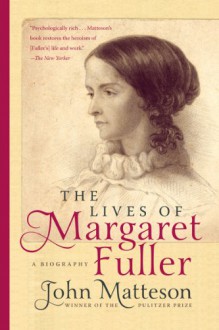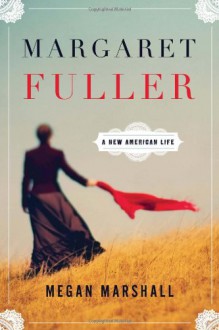

Of late, and for too long, the Muse has left me and I have found little inspiration to write extensive reviews of the books I've been reading. But as I've given this one four stars, I'd be remiss if I entirely neglected to explain why.
I first became aware of Margaret Fuller's existence from a review in the New York Review of Books of one of the recent biographies that have come out and was intrigued (whether this one or Megan Marshall's, I forget). And when I came across this quote (which graces my e-mail address), I knew I had to know more: "I now know all the people worth knowing in America and I find no intellect comparable to my own."
It turns out that my gut reaction was correct: Fuller is a person worth knowing. I've provided some examples of her thoughts and beliefs in my status updates on GoodReads so I will only quote here a sketch culled from Matteson's biography:
I am part of a private group of friends on GR who read books written by dead authors. A number of us have been planning on reading some of the works of Louisa May Alcott in November. I have created a public group for this event, and thought I would extend the invitation here, as well.
I will be reading the books listed above, and discussing them there.
Alcott was part of the American transcendentalist movement, along with Ralph Waldo Emerson, Margaret Fuller, the Peabody sisters, Nathaniel Hawthorne, Bronson Alcott, and Henry David Thoreau. Anything written by or about any of those writers would also be excellent fodder for discussion in the Alcott event!
Please join us, even if all you want to do is talk about how much you loathe Ms. Alcott and her books. All opinions are welcome.
The title of the post will link you to the GR group.
 Margaret Fuller is one of my patron saints and spiritual mentors. She'd make my list of famous people I'd love to have dinner with (but I have to admit I'd be quite intimidated!). A brilliant thinker, philosopher, and writer, Fuller grew up in the heady, fiery, intellectual Boston of the early 19th century, among famed Transcendentalists, philosophers, Unitarian ministers, agitators, organizers, social scions, ex-pat Britons, and blue-blood artists. Despite being a blazing star of her time, admired by some of the most famous American thinkers today, Fuller is depressingly unknown. Here's hoping Marshall's biography is a first step in returning Fuller to her proper place of prominence in American history.Born to schoolmaster-turned-elected official, Fuller's father was a relentless taskmaster, crafting his clever daughter into the model American son -- all the while leaving Margaret to chafe at the limitations she faced as an adult woman. Unable to become a minister, she instead found herself becoming a teacher and writer, growing into a more recognized voice in the Boston literati scene. Conflicted about romantic relationships -- her female friends almost all disappeared once they became wives -- she was torn between an appreciation for the Romantic emphasis on sensuality and the real life ramifications of such behavior. In the end, while covering the revolutionary movements in Italy in the 1840s, she found love and became a mother, writing what she considered her greatest work -- only to die tragically in a shipwreck on her return to the US. As with Winder's brief biography of Plath which I reviewed earlier, Marshall makes no bones about her obvious affection for her subject. That admiration shines through every page, but doesn't mean Marshall is blind to Fuller's flaws; she presents a complicated woman fully, in the context of her time. A blurb on the back describes this as an 'empathetic biography', which is precisely how I found this to read. (It helped immensely that Marshall has the same feelings toward the Transcendentalist and Unitarian crowd as I do -- when she suggested Bronson Alcott was, perhaps, a 'charlatan', I literally cackled with delight!)In her Prologue, Marshall wrote she once wanted to write a biography of Fuller "that turned away from the intrigues of her private life, that spoke of public events solely," and I admit, my heart sank. Fuller is one of the original 'the personal is political' figures for me, and I bristled at the thought that her intimate life (experiences as woman, not her sex life) would be separated from her 'public' life. Marshall quickly explained how impossible that endeavor was -- even silly -- as Fuller lived and breathed philosophy, revolution, and identity. Marshall's style is to use Fuller's own words to tell her story, which means the narrative doesn't read quite as smoothly as some biographies but I found I grew used to the style and was sucked in. There's a slightly circuitous feel to the book at times, as Marshall gleans from letters and journals of others to fill in the places where she doesn't have Fuller's exact language, but in the end, I found this style rather breathtaking. In a way, it felt as if Fuller was dictating her biography.Although hefty -- 496 pages -- this reads much faster and while dense at moments (the book presumes some awareness of the Transcendentalists), it is completely readable. For those who love remembering the forgotten women of history, get this book (I'd recommend April Bernard's novel Miss Fuller first, then this book, to get a lovely picture of the woman.).
Margaret Fuller is one of my patron saints and spiritual mentors. She'd make my list of famous people I'd love to have dinner with (but I have to admit I'd be quite intimidated!). A brilliant thinker, philosopher, and writer, Fuller grew up in the heady, fiery, intellectual Boston of the early 19th century, among famed Transcendentalists, philosophers, Unitarian ministers, agitators, organizers, social scions, ex-pat Britons, and blue-blood artists. Despite being a blazing star of her time, admired by some of the most famous American thinkers today, Fuller is depressingly unknown. Here's hoping Marshall's biography is a first step in returning Fuller to her proper place of prominence in American history.Born to schoolmaster-turned-elected official, Fuller's father was a relentless taskmaster, crafting his clever daughter into the model American son -- all the while leaving Margaret to chafe at the limitations she faced as an adult woman. Unable to become a minister, she instead found herself becoming a teacher and writer, growing into a more recognized voice in the Boston literati scene. Conflicted about romantic relationships -- her female friends almost all disappeared once they became wives -- she was torn between an appreciation for the Romantic emphasis on sensuality and the real life ramifications of such behavior. In the end, while covering the revolutionary movements in Italy in the 1840s, she found love and became a mother, writing what she considered her greatest work -- only to die tragically in a shipwreck on her return to the US. As with Winder's brief biography of Plath which I reviewed earlier, Marshall makes no bones about her obvious affection for her subject. That admiration shines through every page, but doesn't mean Marshall is blind to Fuller's flaws; she presents a complicated woman fully, in the context of her time. A blurb on the back describes this as an 'empathetic biography', which is precisely how I found this to read. (It helped immensely that Marshall has the same feelings toward the Transcendentalist and Unitarian crowd as I do -- when she suggested Bronson Alcott was, perhaps, a 'charlatan', I literally cackled with delight!)In her Prologue, Marshall wrote she once wanted to write a biography of Fuller "that turned away from the intrigues of her private life, that spoke of public events solely," and I admit, my heart sank. Fuller is one of the original 'the personal is political' figures for me, and I bristled at the thought that her intimate life (experiences as woman, not her sex life) would be separated from her 'public' life. Marshall quickly explained how impossible that endeavor was -- even silly -- as Fuller lived and breathed philosophy, revolution, and identity. Marshall's style is to use Fuller's own words to tell her story, which means the narrative doesn't read quite as smoothly as some biographies but I found I grew used to the style and was sucked in. There's a slightly circuitous feel to the book at times, as Marshall gleans from letters and journals of others to fill in the places where she doesn't have Fuller's exact language, but in the end, I found this style rather breathtaking. In a way, it felt as if Fuller was dictating her biography.Although hefty -- 496 pages -- this reads much faster and while dense at moments (the book presumes some awareness of the Transcendentalists), it is completely readable. For those who love remembering the forgotten women of history, get this book (I'd recommend April Bernard's novel Miss Fuller first, then this book, to get a lovely picture of the woman.).

“I will never do as Waldo does . . . flee to the woods”
Margaret Fuller was the intellectual equal of her close friend Ralph Waldo Emerson, but while he was retiring she had a passionate, engage-the-world personality that makes Megan Marshall’s thoroughly researched and engaging biography of her the most moving book I’ve read in a long time. The book opens with Margaret as a precocious child, who from an early age was driven to excel intellectually by her father in spite of the fact that she was a daughter not a son, and it ends with the heartbreaking ship wreck that killed Margaret and her new husband and child within sight of the Long Island shoreline.
In between Margaret wrote books that challenged the status quo regarding women, culture, and politics. While she was part of the Transcendentalist school of thought she traveled far from New England. During a trip to the Great Lakes region she spent time with Native Americans, afterwards writing about the plight of their culture, and she was in Europe as a correspondent during the continent wide upheavals of 1848. It took me a long time to finish this biography because I kept pausing to read some of Margaret’s own works, which are available for free on sites like Project Gutenberg and Google Books.
Margaret was brilliant in a time when smart woman made men uncomfortable. Gender limited her options, but Margaret tried to use her well developed intellect to play an important role in the world like the heroes of America’s Revolutionary War that she admired. In spite of her antipathy to marriage as it was practiced in the mid-1800’s, Margaret longed for a full life with love and a child of her own, yearnings that were not fulfilled until a few years before her death.
This biography by Megan Marshall held me rapt because it brought both Margaret Fuller and the post-Revolutionary, pre-Civil War era in the United States and Europe to life for me. The book’s pages are full of the intellectual, revolutionary and literary leaders of the time, and Margaret's own words, quoted throughout the text, are so well put and insightful even now that I found myself underlining almost all of them.